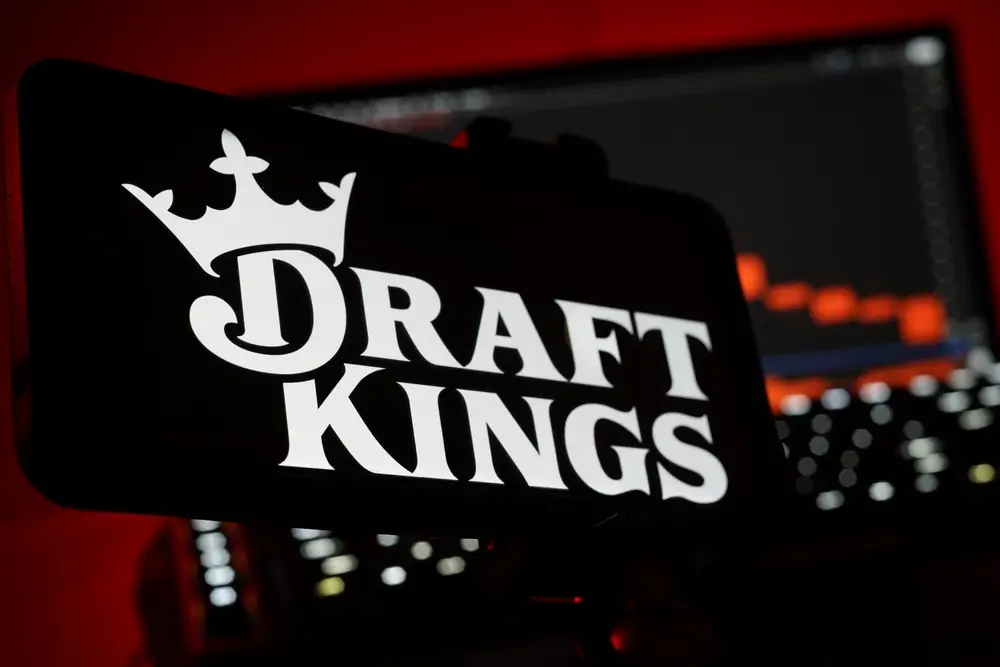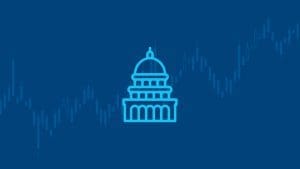In late September, leading U.S. prediction market platform Kalshi introduced what it calls “combos” for its wildly popular football markets. By letting users combine multiple trades for a potentially bigger return, Kalshi appeared to finally be going full-steam into same game parlays, the popular high-risk, high-reward type of betting that has proven to be a highly lucrative offering at online sportsbooks.
Kalshi getting into what has become a cornerstone product of sportsbooks had an immediate impact on the stock prices of top online sports betting operators like DraftKings and Flutter Entertainment, the parent company of FanDuel. Coupled with news of Robinhood and Kalshi’s blockbuster trading volume, driven primarily by sports event contracts, Flutter and DraftKings stock was down 11% in the immediate aftermath of the parlay introduction.
The stock drop led to Wall Street and gaming industry analysts either proclaiming prediction markets presented an existential threat to the online sports betting industry or stating that the dip was an overreaction.
A week later, DraftKings and Flutter stocks still haven’t rebounded, with shares falling as much as 6% on Oct. 7. DraftKings is down 28% over the past month, while Flutter is down 18%, as Barron’s points out.
Prediction markets have “narrative momentum”
Prediction markets have been a hot topic, logically, at the 2025 Global Gaming Expo (G2E) in Las Vegas this week. Chris Grove of Eilers & Krejcik, a leading gaming industry research and consulting firm, gave a prediction markets-focused industry briefing on G2E’s opening day that offered a wide-lens perspective on the in-motion disruption.
Grove pointed out that leading prediction platforms like Kalshi and Polymarket are coming into the gaming industry backed by big fintech companies like Coinbase, Crypto.com, and Robinhood, as well as top investors. Those fintech companies, Grove wrote, “sit in a different strata when it comes to user base, AUM, and other measures of access to the U.S. audience compared to most OSBs.”
Grove also wrote that prediction markets currently have “unique access to mindshare” that crosses over into the worlds of politics, news, and sports. He also points out prediction markets’ current “narrative momentum,” which has likely played a part in spooking OSB stock traders. Tuesday’s drop for DraftKings and Flutter stock, for example, came after another major piece of legitimizing news for prediction markets, with Polymarket announcing an up to $2 billion investment from New York Stock Exchange parent company Intercontinental Exchange (ICE).
“Companies like Coinbase, Kalshi, and Polymarket are enjoying narrative tailwinds while DraftKings et al are encountering increasing headwinds,” Grove wrote.
Sports betting operators’ “rock and a hard place” predicament
In an X thread in which he shared slides from the G2E presentation, Grove summed up online sports betting operators’ predicament by saying, “The pace of prediction market developments is so aggressive that it demands all stakeholders aggressively re-evaluate the likely outcomes.”
Grove, in his presentation, wrote that the recent stock sell-offs put DraftKings and Flutter’s “rock and a hard place” predicament “in sharp relief.” He says that it’s unclear whether or not they and other sports betting platforms can please both shareholders and the state regulators who’ve been increasingly warning against getting into prediction markets or else risk losing their licenses to offer their other products in those jurisdictions.
But, Grove said, waiting for regulatory challenges to settle, which appears to be the long-view taken by some top sports betting platforms, may not be tenable.
“Wait-and-see is looking more costly by the day, although prediction markets may still prove to be a fever that breaks,” he wrote.
On X, Grove wrote that regulated gambling industry participants need to be aware of the growing “institutional support” behind prediction markets, with “deep connections” to the government and finance industry.
“At some level of institutional support, we reach a tipping point where other institutions (e.g., leagues) feel comfortable participating in prediction markets as well as OSB — or, more worryingly, *instead* of OSB if regulators force them to make a choice,” Grove wrote. “I’m not saying we’re at that level yet, but it feels like it’s no longer that far out on the horizon.”
“As we approach that point,” Grove continued, “we will see a further bifurcation of gambling stakeholders. Those who benefit more from regulatory capture and who are less able to escape it (i.e., people who run physical casinos) will be less able to respond to the rise of prediction markets.”
CEOs remain confident in traditional sports betting’s endurance
Some Wall Street analysts have also advised that online sports betting companies will need to do something to address prediction markets’ increasing attention and market share. Jordan Bender, an equity research analyst at Citizens, recently told Bloomberg that he has been swamped with inquiries from clients about the prediction market threat.
“These companies need to come out with a strategy for investors — whether it’s launching prediction markets or stepping up marketing,” Bender said. “Until that happens, the prediction markets present a risk.”
For their part, most OSB companies have remained cagey in their public comments about prediction markets. Officials from the leading U.S. sportsbooks have generally said they’re keeping a close eye on developments, while also acknowledging the need to not upset state regulators and jeopardize their licenses. Flutter/FanDuel became the first mainstream sportsbook to take concrete steps into prediction markets, but it made a point of stating that its partnership with the CME Group (which will reportedly result in a separate FanDuel trading app) would not include offering sports event contracts.
At G2E, CEOs from some of the top online sports betting platforms again addressed prediction markets, mixing some of the “wait and see” attitude with a sense of confidence that they’ll be fine with or without them.
DraftKings CEO Jason Robins said that while prediction market platforms will have some value in states without a legal sports betting market, he feels that in the other states, sportsbooks will come out on top.
“The product of the sportsbook and what it’s able to do is so much stronger than the product of a prediction market,” Robins said, according to InGame. “I just don’t see a world where, in a state that has both (prediction markets and legal sports betting), it’s not clear to the customer that the sportsbook is just a vastly stronger experience.”
Flutter Entertainment CEO Peter Jackson echoed Robins’ sentiments about sportsbooks offering a better experience than prediction markets. Flutter operates the sports betting exchange Betfair in the U.K., where it only accounts for a fraction of the sports betting market share. Jackson said struggles with developing competitive parlay products and being able to offer bonuses has hindered the growth of those “prediction markets” in the U.K.
“You can’t offer real generosity (with bonuses) on these exchanges, because you’re sat in the middle … and consumers love generosity,” Jackson said. “And it is very difficult to find liquidity in all the different permutations you can have within the parlay product, and it’s more difficult if you have to put up capital behind every bet.”
Legal challenges to sports event contracts remain key
In light of prediction market momentum, Wall Street analysts have generally either slightly lowered or maintained price targets for DraftKings, while Flutter is still rated a “Strong Buy” by many.
Last week, investment firm Spruce Point Capital Management announced it was shorting DraftKings following an extensive forensic review. The report has been cited in media coverage about prediction markets denting sportsbooks’ market share, estimating a “35%-60% potential downside and material market underperformance risk.” It’s important to note here that there have been some critiques of the firm’s underlying assumptions, including inappropriately conflating trading volume with sports betting handle.
“We have serious concerns regarding the impact to (DraftKings’) sports book market share given the significant volume, or handle, being generated by emerging prediction markets for sports betting such as Kalshi and Polymarket,” reads the summary of the Spruce Point report, which predicted that the legal challenges to sports prediction markets will likely go on for a couple more years and will ultimately be resolved by the Supreme Court.
The ongoing legal challenges by states that consider sports event contracts unauthorized and therefore illegal sports betting is the crucial piece of the puzzle that could determine the continuance of the stratospheric growth of prediction markets, as well as their impact on the sports betting industry.
If, ultimately, sports prediction markets continue to be allowed nationwide, the sports betting industry will, obviously, more fully embrace them. In the meantime, platforms like Kalshi, Robinhood, Crypto.com and (soon) Polymarket have a substantial headstart in growing and developing those sports markets, building on their already substantial base of traders and adding more users, including those looking for a viable sports betting alternative.


























